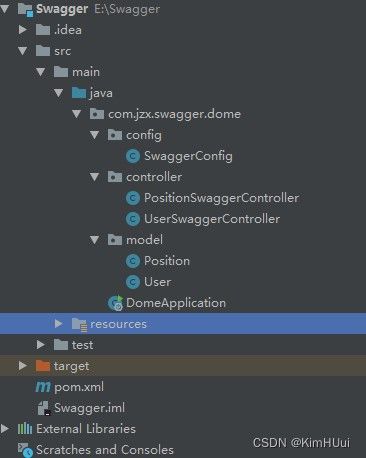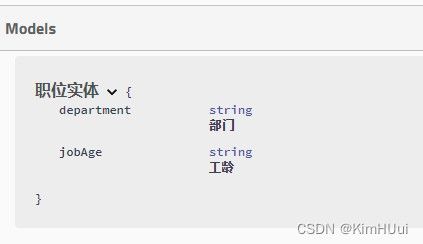spring boot 集成Swagger 2
目录
spring boot 集成Swagger2
1:项目结构
2:pom.xml添加 maven 依赖
3:创建SwaggerConfig.java
4:Model--User的实体类position相同
5:API接口编写-- User请求Position相同
6:启动Spring Boot 应用
7:数据类型返回
Swagger 2 是一个规范和完整的文档框架,它可以用于生成,描述,调用和可视化 RESTful 风格的 Web 服务.
spring boot 集成Swagger2
1:项目结构
● SwaggerConfig 是将swagger2 开启并注入到spring中。用于更改Swagger2 的参数与用法 。
2:pom.xml添加 maven 依赖
io.springfox
springfox-swagger2
2.9.2
io.springfox
springfox-swagger-ui
2.9.2
3:创建SwaggerConfig.java
package com.jzx.swagger.dome.config;
import org.springframework.context.annotation.Bean;
import org.springframework.context.annotation.Configuration;
import springfox.documentation.builders.PathSelectors;
import springfox.documentation.builders.RequestHandlerSelectors;
import springfox.documentation.service.ApiInfo;
import springfox.documentation.service.Contact;
import springfox.documentation.spi.DocumentationType;
import springfox.documentation.spring.web.plugins.Docket;
import springfox.documentation.swagger2.annotations.EnableSwagger2;
import java.util.ArrayList;
@Configuration //用于构建bean定义以及初始化Spring容器。
@EnableSwagger2 //开启Swagger2
public class SwaggerConfig {
@Bean
public Docket docket(){
return new Docket(DocumentationType.SWAGGER_2)
.apiInfo(apiInfo())
.groupName("职位模块")
.enable(true) //配置是否启用Swagger,false游览器无法访问
.select() //通过select去配置扫描接口
//RequestHandlerSelectors配置如何扫描接口
.apis(RequestHandlerSelectors.basePackage("com.jzx.swagger.dome"))
//通过path来过滤,扫描以"/position"开头的接口
.paths(PathSelectors.ant("/position/*"))
.build();
}
@Bean
public Docket docket1(){
return new Docket(DocumentationType.SWAGGER_2)
.apiInfo(apiInfo())
.groupName("用户模块")
.enable(true)
.select()
.apis(RequestHandlerSelectors.basePackage("com.jzx.swagger.dome"))
.paths(PathSelectors.ant("/user/*"))
.build();
}
private ApiInfo apiInfo(){
Contact contact = new Contact("金正鑫", "http://localhost:8080/swagger-ui.html#/", "jinzhengxin2019@163.com");
return new ApiInfo(
"Swagger2 练习文档", //标题
"金正鑫", //作者姓名
"1.0", //版本
"http://localhost:8080/swagger-ui.html#/",
contact,
"Apache 2.0",
"http://www.apache.org/licenses/LICENSE-2.0",
new ArrayList());
}
}● @configuration :让spring加载该配置类
● @EnableSwagger2 :启用Swagger2
● 创建Docket的 @Bean ,应用Docket方法来配置Swagger2 ,上述代码创建了两个@Bean (职位模块和用户模块),这样在页面文档将有两个模块,每个模块只显示对应的请求。
4:Model--User的实体类position相同
package com.jzx.swagger.dome.model;
import io.swagger.annotations.ApiModel;
import io.swagger.annotations.ApiModelProperty;
@ApiModel("用户实体类")
public class User {
@ApiModelProperty("用户名")
public String username;
@ApiModelProperty("密码")
public String passwrod;
public User() {
}
public String getUsername() {
return username;
}
public void setUsername(String username) {
this.username = username;
}
public String getPasswrod() {
return passwrod;
}
public void setPasswrod(String passwrod) {
this.passwrod = passwrod;
}
}添加下面两个注解会在Swagger2的页面中会显示这个模块所使用的实体类和实体类参数的意义。
● @ApiModel () :描述是什么实体类
● @ApiModelProperty() :描述实体类参数的意义
5:API接口编写-- User请求Position相同
package com.jzx.swagger.dome.controller;
import com.jzx.swagger.dome.model.User;
import io.swagger.annotations.Api;
import io.swagger.annotations.ApiImplicitParam;
import io.swagger.annotations.ApiOperation;
import io.swagger.annotations.ApiParam;
import org.springframework.web.bind.annotation.GetMapping;
import org.springframework.web.bind.annotation.RestController;
@Api(description = "用户管理")
@RestController
public class UserSwaggerController {
@GetMapping("/user/message")
@ApiOperation(value = "返回用户信息",response = User.class ,notes = "用户")
@ApiImplicitParam(name = "user",value = "用户",dataType = "User")
public User user( User user){
return user;
}
@GetMapping("/user/username")
@ApiOperation(value = "返回用户名",response = User.class,notes = "用户名")
public String user1(@ApiParam(value = "用户名",required = true,name = "用户名") String username){
return username;
}
}● @Api():修饰整个类,描述Controller的作用
● @ApiOperation():描述一个类的一个方法,或者说一个接口
● @ApiParam():单个参数描述
● @ApiImplicitParam():描述一个请求参数,可以配置参数的中文含义,还可以给参数设置默认值
6:启动Spring Boot 应用
用户模块
职位模块
7:数据类型返回
● controlller
●MODEL







